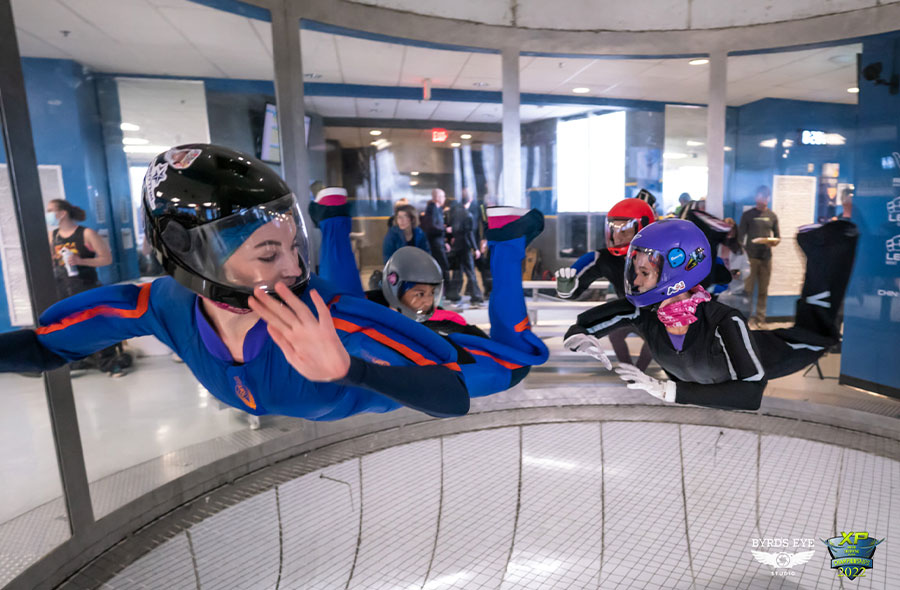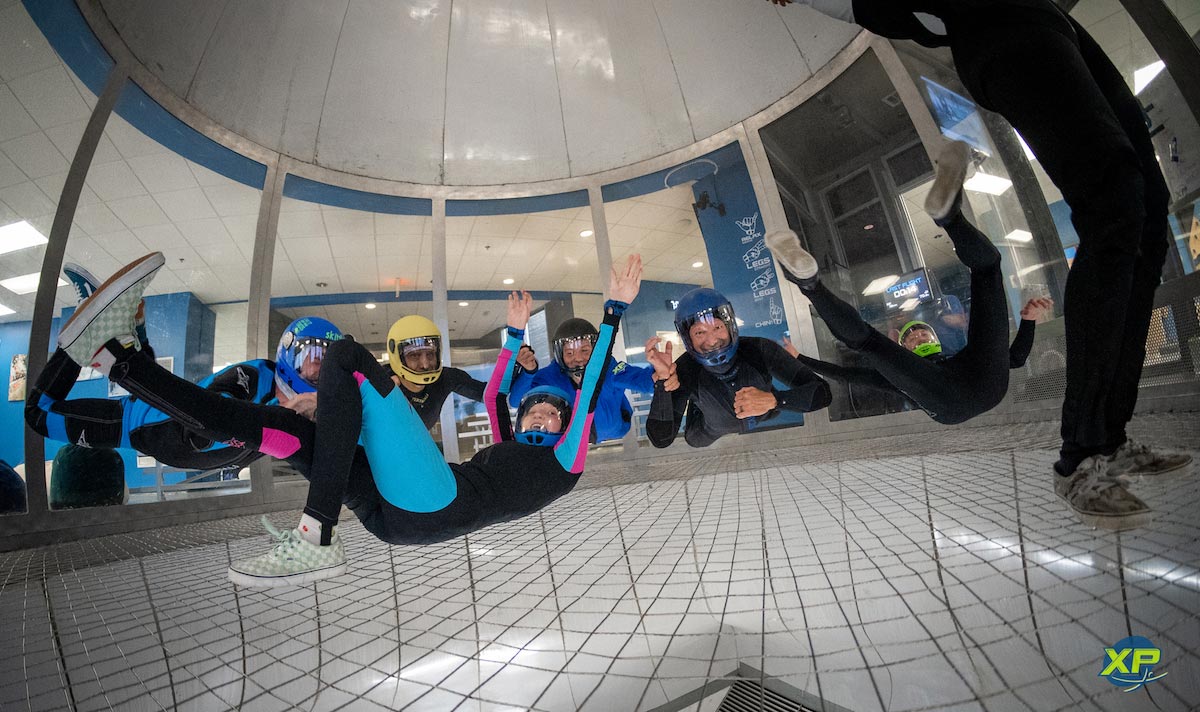Can You Do Indoor Skydiving While Pregnant?
Thursday, April 11, 2024
- Team XP
- 4/11/24
- 0
- Indoor Skydiving
Indoor skydiving stands out for its broad accessibility, attracting enthusiasts from excited toddlers to spirited seniors. Unlike traditional skydiving, which typically requires that you’re at least 18 years or older, indoor skydiving opens its doors to flyers as young as three years old. So it’s not surprising that a question we’re frequently asked is: Can you indoor skydive while pregnant? Technically, yes. But should you? That’s where the conversation gets intricate. Most facilities, with safety as their guiding principle, advise against participation during pregnancy.

Understanding Indoor Skydiving
Before we answer the question “Can you go indoor skydiving while pregnant?”, it’s essential to understand what indoor skydiving entails. This thrilling activity replicates the sensation of freefall within a vertical wind tunnel, eliminating the need for an airplane. You float on a cushion of air, guided by an experienced instructor, allowing you to master aerial maneuvers in a controlled environment. Equipped with a specially designed jumpsuit and helmet, you experience the rush of wind as you navigate vertical space. And at Paraclete XP, we boast the title of the largest vertical wind tunnel in the United States!! Our tunnel stretches up to 53 feet tall and reaches wind speeds up to 180 mph!
Is Indoor Skydiving Risky?
So, is indoor skydiving safer than skydiving? Generally, indoor skydiving is considered relatively low risk, with bumps and bruises being some of the main injuries seen. However, despite the controlled environment offered by indoor skydiving, where even children as young as three can fly safely, the activity is not recommended for those who are pregnant. This decision is rooted in an understanding of the inherent risks, despite the extensive safety measures in place.
It’s important to note that pregnancy is not the only restriction for indoor skydiving, check out our FAQ page for more on who can’t do indoor skydiving.
Potential Concerns for Pregnant Flyers
We’ve established that indoor skydiving is a thrilling experience that comes with risks that pregnant people should be mindful of. Let’s take a look at six potential concerns about making an indoor jump while pregnant:
1. Pre-existing Conditions
Individuals with certain pre-existing medical conditions may find the activity riskier, especially in the context of pregnancy. Conditions like heart problems, high blood pressure, and previous complications in pregnancy could be exacerbated by the physical stress and environmental conditions of indoor skydiving.
2. Collisions
Despite there being a structured progression designed to minimize risk, the possibility of colliding with other flyers or the tunnel’s glass walls remains. Such impacts, particularly to the abdominal area, post significant risks during pregnancy.

3. Physical Demand
Contrary to appearances, indoor skydiving is a rigorous activity and quite the workout! As a matter of fact, indoor skydiving burns even more calories than jogging! The vigorous nature of this exercise may place undue strain on you while pregnant.
4. Air Pressure
The controlled environment of a wind tunnel subjects you to constant, high-velocity airflow, designed to simulate the conditions of freefalling. The dynamic nature of the wind speeds, which are adjusted to facilitate the floating sensation, means the body must constantly adapt to varying pressures. The specific effects of these conditions on pregnancy haven’t been thoroughly investigated, but the precautionary principle suggests minimizing exposure to such environmental stresses during pregnancy.
5. Adrenaline & Emotional Stress
The exhilarating nature of indoor skydiving often induces an adrenaline rush, which can vary in its effects on pregnant people. Some may experience heightened excitement, others might face increased stress or anxiety. While the effects of adrenaline on pregnancy are not fully understood and moderate physical activity is generally safe during pregnancy, you should approach activities that provoke excessive stress with caution and discuss any plans to engage in adrenaline-inducing activities with your doctor.
6. Balance & Equilibrium
Pregnancy induces physiological changes like shifts in center of gravity, hormonal fluctuations, and loosened ligaments, affecting balance and equilibrium. Research suggests altered proprioception, or spatial awareness, during pregnancy may heighten the risk of balance control issues. Additionally, your blood pressure drops in the second trimester, exacerbating the potential for dizziness during rapid position changes. These factors amplify your risk of falls or accidents during activities that require precise balance, like indoor skydiving.
While indoor skydiving is an inclusive sport, the limitations for pregnant flyers stem from a place of caution and care. While seasoned skydivers may feel inclined to continue their skydiving practice into pregnancy, the collective advice leans towards erring on the side of caution for newcomers. Ultimately, you should consult with your healthcare provider before flying in the tunnel.
Fortunately, the thrilling world of indoor skydiving awaits with open arms, ready to offer the same exhilarating experience once you’re ready for your post-bump return to the windy tube! Have questions? Connect with our team! We can’t wait for you to fly with us – and for you to make it a family affair once your little one is three!! Let’s go!

Thanks so much for a wonderful first time adventure for me and my 5 year old great-niece; and also my 2nd timer niece. I felt very safe and informed through the whole process. My only wish is that we had ParacleteXP in Minnesota-with you to guide us! Thanks again for a wonderful time. We will DEFINITELY be back next time when in NC.
Ellen Adams
Copyright © 2025, Paraclete XP Indoor Skydiving, All Rights Reserved.
DropZone Web Design & Marketing by Beyond Marketing, LLC